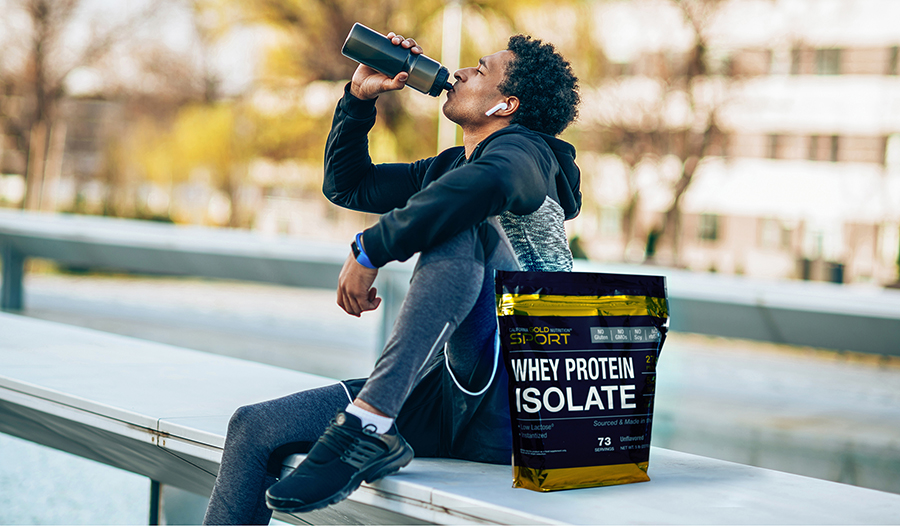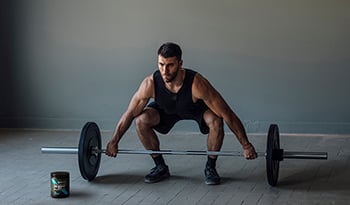Voimavalmentajan vinkit treeniä edeltävään ravitsemukseen

Tärkeimmät johtopäätökset
- Valitse aterioita, joista pidät, joita sinulla on saatavilla ja jotka eivät haittaa suorituskykyäsi. Ajoita ja suunnittele ateriasi lähtökohtaisesti sen perusteella, mikä mahdollistaa parhaan suorituskykysi.
- Valitse korkealaatuisia proteiineja, sillä ne sisältävät enemmän aminohappoja, jotka voivat vaikuttaa lihasten proteiinisynteesiin (palautuminen ja kasvu).
- Hiilihydraattien lähteiden tulisi ihannetapauksessa vastata päivittäistä saantia ja suoritettavaa toimintaa. Koska hiilihydraatit voivat auttaa lihasten proteiinisynteesissä ja energiatasojen ylläpitämisessä, valitse hiilihydraattilähteet, kuten proteiinin lähteet, joita pidät mieluisina ja jotka ovat helposti saatavilla.
- Harkitse treeniä edeltäviä lisäravinteita ravitsemuksellisten puutteiden korjaamiseksi.
Miksi treeniä edeltävä ravitsemus on tärkeää
Puhuessamme treeniä edeltävästä ja sen jälkeen nautitusta ravinnosta, treenin jälkeinen ravitsemus varastaa usein valokeilan. On paljon yleisempää kuulla ihmisten keskustelevan siitä, mitä pitäisi syödä harjoituksen jälkeen kuin mitä nauttia sitä ennen. Teoriassa tämä on järkevää, eikö niin? Olemmehan juuri kuluttaneet energiaa ja treenanneet, joten on normaalia miettiä: ”Mitä minun pitäisi syödä, jotta saisin aikaan myönteisen muutoksen?”
Vaikka treenin jälkeinen ravitsemus on tärkeää myönteisten treeni- ja palautumistulosten luomiseksi, on treeniä edeltävä ravitsemus yhtä tärkeää. Se, mitä syömme ennen harjoittelua, voi parantaa kehomme suorituskykyä ja treenin jälkeistä palautumista.
Tässä artikkelissa käsittelemme, mitä kuntoilua edeltävä ravitsemus on, miksi sillä on merkitystä ja kuinka voit hyödyntää sitä omaksi eduksesi.
Mitä on treeniä edeltävä ravitsemus?
Treeniä edeltävä ravitsemus sisältää kaiken, mitä nautimme tarkoituksellisesti sisäisesti ennen harjoittelua. Yleensä tämä tarkoittaa ruokia, nesteitä ja urheiluravinteita, joita nautimme noin kaksi tuntia ennen treeniä suorituskyvyn ja palautumisen optimoimiseksi.
Treenaamisen ja tavoitteellisen harjoittelun yhteydessä treeniä edeltävä ravitsemus tarkoittaa usein korkealaatuisen proteiinin ja hiilihydraattien nauttimista, joita sitten käytetään suorituskyvyn tukemiseen.
Todellisuudessa kaikkea, mitä laitamme kehoomme ennen harjoittelua, voitaisiin pitää harjoitusta edeltävänä ravintona. Pitääksemme kuitenkin artikkelin lyhyenä rajoitamme keskustelun ajallisesti (2–4 tuntia ennen treeniä) ja keskitymme treeniä edeltävään ravitsemukseen proteiinin ja hiilihydraattien lähteiden kulutuksen kannalta.
Treeniä edeltävän ravinnon edut
On lukemattomia syitä ja etuja, miksi meidän kannattaa miettiä treeniä edeltävää ravitsemustamme.
Ennen kuin jatkat lukemista, on hyvä huomioida, että sinun ei tarvitse olla vakava urheilija tai painonnostaja ollaksesi kiinnostunut treeniä edeltävästä ravinnosta. Myönteiset muutokset suorituskyvyssä ja kehon koostumuksessa syntyvät pienistä, tarkoituksellisista toimista. Treeniä edeltävä ravitsemus voi olla yksi niistä toimista, jotka voivat auttaa tukemaan kasvua monilla suorituskyvyn ja elämän osa-alueilla.
Optimoi palautuminen
Ensimmäinen syy siihen, miksi treeniä edeltävä ravitsemus on tärkeä, on palautuminen. Kun syömme päivän aikana, kehomme sulattaa jatkuvasti syömäämme ja käyttää syömäämme ruokaa ja juomaa energianlähteenä ja palautumiseen. Eri ruokien ja aterioiden sulamisnopeus vaihtelee useiden tekijöiden perusteella, mutta ruoansulatus tapahtuu yleensä jossain määrin, ellei ole paastolla.
Treenaamisen ja lihasten kasvun yhteydessä lihasten proteiinisynteesi on yleensä se muuttuja, joka kiinnostaa useimpia painonnostajia. Lihasten proteiinisynteesi tarkoittaa proteiinin hyödyntämistä lihasten rakentamisessa ja palautumisessa. Syömällä strategisesti ennen ja jälkeen treenin voimme luoda ympäristön, joka suosii lihasten proteiinisynteesiä, mikä voi tukea parempaa palautumista ja kasvua.
Paranna suorituskykyä
Toinen syy siihen, miksi treeniä edeltävä ravitsemus on tärkeää ottaa huomioon, on suorituskyky. Me kaikki haluamme tehdä parhaamme, ja me kaikki tiedämme, miltä tuntuu suorittaa matalalla energiatasolla. Luomalla strategisen harjoittelua edeltävän ravitsemussuunnitelman voimme suojata sijoituksemme ja estää huonot suorituspäivät riittämättömän ravinnon vuoksi.
Harjoittelemme kaikki eri intensiteeteillä ja modaliteeteilla, mikä tarkoittaa, että meidän on otettava huomioon harjoitusta edeltävä ravitsemuksemme yksilöllisesti. Tämä tarkoittaa treeniä edeltävien valintojen tekemistä sen perusteella, mikä auttaa meitä tuntemaan ja suoriutumaan parhaimmistamme, ja vastaa helposti saatavilla olevia ja nautittavia ruokavaihtoehtoja. Periaatteessa meidän on räätälöitävä suunnitelmamme eikä noudatettava mielivaltaista ajatusta ”täydellisestä” harjoittelua edeltävästä ravinnosta.
Miten voin ruokkia kehoani ennen treeniä?
Sen sijaan, että tarjoaisin treeniä edeltäviä aterioita ja kutsuisin niitä ”parhaiksi”, keskustellaan tästä aiheesta järjestelmällisestä näkökulmasta. Ravitsemus on erittäin yksilöllistä, ja meidän on muistettava tämä luodessamme treeniä edeltäviä ja sen jälkeisiä ravitsemusvalintoja.
Pohjimmiltaan tapa valita treeniä edeltävät ateriat voi perustua useisiin kriteereihin, kuten:
- Minkä tyyppistä kuntoilua harrastat
- Tavoittelemasi muutokset
- Minkä tyyppisiä ruokia sinulla on helposti saatavilla
- Mitä mieltymyksiä sinulla on
- Tutkimuslähtöinen näyttö tehokkuudesta
Jos pystymme luomaan harjoitusta edeltävän ravitsemusohjelman, joka sopii yksilölliseen elämäntyyliimme ja tavoitteisiimme, pystymme paremmin noudattamaan sitä.
Treeniä edeltävää ravitsemussuunnitelmaa laadittaessa on tärkeää ottaa huomioon, millaista liikuntaa aiot harrastaa. Harrastatko pitkäkestoista kestävyyslajia, lyhyitä voimaharjoituksia vai kohtuullisen intensiivistä liikuntaa? Kaikissa näissä lajeissa käytetään erilaisia energiajärjestelmiä ja -varastoja treenin eri vaiheissa. Kun otat tämän huomioon, voit valita paremmin ruokia, jotka tukevat suorituskykyäsi.
Tässä muutamia esimerkkejä siitä, miten voit luoda aterioita aktiviteettiesi perusteella:
- Kestävyys: Vähärasvainen, runsaasti hiilihydraatteja, kohtuullisesti proteiinia
- Painonnosto ja kohtalainen intensiteetti: Vähärasvainen, kohtuullisesti hiilihydraatteja ja proteiinia
Tältä pohjalta voimme sitten yhdistää suorittamamme aktiviteetit tavoitteisiimme. Jos olet esimerkiksi kestävyysurheilija, suorituskyvyn lisääminen on todennäköisesti tavoitteidesi kärjessä. Tässä tapauksessa on hyvä valita hiilihydraattilähteitä, jotka ylläpitävät harjoittelusi kestoa. Eliittikestävyysurheilijoille voi olla hyödyllistä tutustua myös harjoittelun aikana nautittaviin hiilihydraattilähteisiin.
Jos tavoitteena on lihasten kasvu ja voimistuminen, hiilihydraattien ja korkealaatuisten proteiinilähteiden valitseminen ennen treeniä on järkevintä lihasten hypertrofian kannalta. Muista, että hiilihydraattien ja proteiinien on ehdotettu vaikuttavan lihasten proteiinisynteesin lisääntymiseen treenin jälkeen.
Kun olemme tunnistaneet harjoittelun lajin ja intensiteetin sekä pohtineet tavoitteitamme, voimme alkaa suunnitella itsellemme sopivimpia aterioita mieltymystemme, saatavuuden ja kustannusten perusteella.
Esimerkkejä treeniä edeltävistä aterioista
Optimoidessasi kuntoilua edeltävää ja sen jälkeistä ravintoa, kannattaa pitää joitakin ruokavalion perusasioita mielessä:
- Valitse korkealaatuisia proteiinilähteitä, kun niitä on saatavilla.
- Proteiinijauhe ja ravitsemuksellisesti tiheät täysviljaproteiinit toimivat hyvin.
- Kuluta hiilihydraattilähteitä suorittamiesi aktiviteettien perusteella.
- Valitse kestävyysaktiviteeteissa hieman suurempi hiilihydraattien saanti.
- Valitse kohtalaisen intensiteetin aktiviteeteissa kohtalainen hiilihydraattien saanti.
Katsotaan joitain esimerkkejä siitä, miltä treeniä edeltävät ateriat voisivat näyttää. Muista, että nämä ovat vain esimerkkejä, joten tee omat ravitsemusvalintasi mieltymystesi perusteella.
1. esimerkki: 1 tunti ennen juoksua
- Kaurahiutaleita kanelin ja heraproteiinipirtelön kanssa
- Miksi: Hitaasti sulava hiilihydraattilähde, korkealaatuinen proteiinilähde, jossa on runsaasti aminohappoa .
2. esimerkki: 2 tuntia ennen voimaharjoittelua
- Kananrinta/vähärasvainen jauhettu kalkkuna/vähärasvainen naudanliha ja peruna hedelmillä
- Miksi: Hitaasti ja nopeasti sulava hiilihydraattilähde, korkealaatuinen täysruokaproteiini.
3. esimerkki: 30 minuuttia ennen harjoittelua (voimaharjoittelu ja juoksu)
- Kaksi appelsiinia ja kreikkalaista jogurttia
- Miksi: Nopeammin sulavat hiilihydraatit ja vähärasvainen proteiinilähde rajoittavat ”täyteyden” tunnetta.
Yllä on esimerkkejä aterioista, jotka voitaisiin optimoida treeniä edeltävään ravitsemukseen. Näiden esimerkkien tarkoituksena on korostaa, että harjoitusta edeltävät ateriat tulisi rakentaa haluamillasi ja helposti saatavilla olevilla elintarvikkeilla.
Älä unohda vettä: Harjoitusta edeltävä nesteytysstrategia
Vaikka keskitymme usein makroihin, vesi on luultavasti tärkein suorituskykyä edistävä ”lisäravinne”. Tutkimukset osoittavat johdonmukaisesti, että treenin aloittaminen nestehukassa (jopa vain 2 %:n nestehukka kehon painosta) voi heikentää merkittävästi aerobista suorituskykyä, vähentää henkistä keskittymiskykyä ja lisätä koettua rasitusta. Varmistaaksesi, että nesteytystasosi on riittävä ennen kuntosalille astumista, käytännön nyrkkisääntö on kuluttaa noin 500–600 ml vettä noin 2 tuntia ennen liikuntaa.
Vesi yksinään ei kuitenkaan aina riitä, varsinkin jos hikoilet paljon tai treenaat kuumassa. Tarvitset elektrolyyttejä, erityisesti natriumia, jotta kehosi voi säilyttää nesteen ja ylläpitää lihasten toimintaa. American College of Sports Medicine toteaa, että elektrolyyttejä sisältävien juomien nauttiminen ennen liikuntaa voi auttaa tasapainottamaan nesteen määrää paremmin kuin pelkkä vesi. Jos treeniä edeltävä ateria on vähäsuolaista, harkitse elektrolyyttiseoksen lisäämistä veteen kramppien ja varhaisen väsymyksen ehkäisemiseksi.
Tavoitekohtainen ravitsemus: Makrojen räätälöinti
Sama ravitsemus ei sovi kaikille, ja treeniä edeltävän aterian tulisi heijastaa yksilöllisiä kuntoilutavoitteitasi. Näin voit säätää saantiasi sen mukaan, mitä haluat saavuttaa:
Rasvanpolttoon
Tavoitteena on lisätä harjoittelun intensiteettiä ilman kalorien ylijäämää. Keskity proteiinipitoiseen ateriaan, jossa on kohtuullisesti hiilihydraatteja (eikä liikaa). Näin varmistat, että sinulla on tarpeeksi energiaa kovaa harjoittelua varten – mikä on välttämätöntä kalorien polttamiseksi – ja samalla priorisoit proteiinia, joka auttaa säilyttämään lihasmassaa kalorivajeen aikana. Tutkimukset osoittavat, että proteiinin nauttiminen ennen liikuntaa voi auttaa lisäämään lepoenergiankulutusta (aineenvaihduntaa) verrattuna pelkkiin hiilihydraatteihin.
Lihasten kasvuun (hypertrofia)
Jos tavoitteenasi on lihasten kasvattaminen, sinun on minimoitava lihasten hajoaminen ja maksimoitava synteesi. Syö ateria, joka sisältää runsaasti sekä proteiinia että hiilihydraatteja. Hiilihydraatit (tavoitteena 1–2 g painokiloa kohti) tarjoavat glykogeenia, jota tarvitaan suurten painojen nostamiseen. Proteiini puolestaan varmistaa, että veressä on tasainen aminohappojen virta harjoituksen aikana, mikä luo suotuisan anabolisen ympäristön.
Kestävyyteen
Jos harrastat juoksua, pyöräilyä tai pitkäkestoista kardiota (>60 minuuttia), hiilihydraatit ovat paras ystäväsi. Ensisijainen tavoitteesi on täydentää glykogeenivarastot väsymyksen viivästyttämiseksi. Kestävyyskunnon maksimoimiseksi on suositeltavaa nauttia runsaasti hiilihydraatteja (1–4 g painokiloa kohti) tapahtumaa edeltävien 1–4 tunnin aikana.
Työskentelemällä voimavarojemme puitteissa meillä on parempi mahdollisuus luoda pitkän aikavälin tavoitteidemme kannalta realistinen ravitsemussuunnitelma.
Lähteet:
- Kerksick CM, Arent S, Schoenfeld BJ, Stout JR, Campbell B, Wilborn CD, Taylor L, Kalman D, Smith-Ryan AE, Kreider RB, Willoughby D, Arciero PJ, VanDusseldorp TA, Ormsbee MJ, Wildman R, Greenwood M, Ziegenfuss TN, Aragon AA, Antonio J. International society of sports nutrition position stand: nutrient timing. J Int Soc Sports Nutr. 2017 Aug 29;14:33. doi: 10.1186/s12970-017-0189-4. PMID: 28919842; PMCID: PMC5596471.
- Mata F, Valenzuela PL, Gimenez J, Tur C, Ferreria D, Domínguez R, Sanchez-Oliver AJ, Martínez Sanz JM. Carbohydrate Availability and Physical Performance: Physiological Overview and Practical Recommendations. Nutrients. 2019 May 16;11(5):1084. doi: 10.3390/nu11051084. PMID: 31100798; PMCID: PMC6566225.
- Tipton KD, Rasmussen BB, Miller SL, Wolf SE, Owens-Stovall SK, Petrini BE, Wolfe RR. Timing of amino acid-carbohydrate ingestion alters anabolic response of muscle to resistance exercise. Am J Physiol Endocrinol Metab. 2001 Aug;281(2):E197-206. doi: 10.1152/ajpendo.2001.281.2.E197. PMID: 11440894.
- Aragon AA, Schoenfeld BJ. Nutrient timing revisited: is there a post-exercise anabolic window? J Int Soc Sports Nutr. 2013 Jan 29;10(1):5. doi: 10.1186/1550-2783-10-5. PMID: 23360586; PMCID: PMC3577439.
- Spriet LL, Watt MJ. Regulatory mechanisms in the interaction between carbohydrate and lipid oxidation during exercise. Acta Physiol Scand. 2003 Aug;178(4):443-52. doi: 10.1046/j.1365-201X.2003.01152.x. PMID: 12864750.
- Jeukendrup A. A step towards personalized sports nutrition: carbohydrate intake during exercise. Sports Med. 2014 May;44 Suppl 1(Suppl 1):S25-33. doi: 10.1007/s40279-014-0148-z. PMID: 24791914; PMCID: PMC4008807.
- Rehrer NJ, Wagenmakers AJ, Beckers EJ, Halliday D, Leiper JB, Brouns F, Maughan RJ, Westerterp K, Saris WH. Gastric emptying, absorption, and carbohydrate oxidation during prolonged exercise. J Appl Physiol (1985). 1992 Feb;72(2):468-75. doi: 10.1152/jappl.1992.72.2.468. PMID: 1559921.
- Sawka, M. N., et al. "American College of Sports Medicine position stand. Exercise and fluid replacement." Medicine and Science in Sports and Exercise. 2007;39(2):377-390. (Describes the negative impact of dehydration on performance and guidelines for fluid intake).
- Maughan, R. J., & Shirreffs, S. M. "Formulating sports drinks: Studies on the efficacy of different formulations." Scandinavian Journal of Medicine & Science in Sports. 2010;20(Suppl 2):68-75. (Discusses the role of electrolytes in fluid retention).
- Hackney, K. J., et al. "Timing protein intake increases energy expenditure 24 h after resistance training." Medicine and Science in Sports and Exercise. 2010;42(5):998-1003. (Supports the metabolic benefits of protein timing).
- Aragon, A. A., & Schoenfeld, B. J. "Nutrient timing revisited: is there a post-exercise anabolic window?" Journal of the International Society of Sports Nutrition. 2013;10:5. (Clarifies the importance of pre- and post-workout protein/carb availability for muscle anabolism).
- Thomas, D. T., et al. "American College of Sports Medicine Joint Position Statement. Nutrition and Athletic Performance." Medicine and Science in Sports and Exercise. 2016;48(3):543-568. (Provides specific carbohydrate guidelines for endurance athletes).
VASTUUVAPAUSLAUSEKE:Tämän hyvinvointiblogin tarkoituksena ei ole tarjota diagnooseja...
















































































 Sisällysluettelo
Sisällysluettelo








